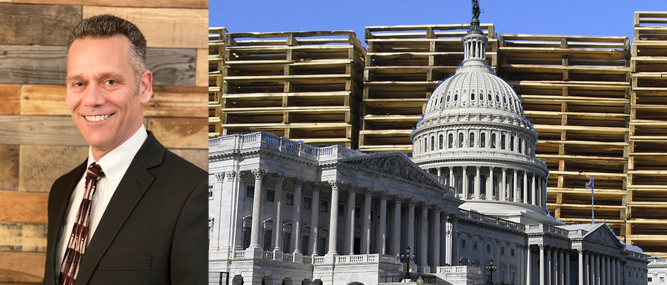Reed Esarove, manager of corporate sales for PalletOne in Bartow, Florida, is chairman of the Government Affairs Committee of the National Wooden Pallet and Container Association (NWPCA). He discusses issues facing the association and current market conditions.
Pallet Enterprise: What’s on the agenda for the NWPCA Government Affairs committee? What issues do you see the committee dealing with for the next 1-2 years?
Esarove: The NWPCA actively works to establish strong, long-term, bipartisan relationships with members of Congress who serve on committees with jurisdiction over the organization’s policy priorities. These relationships advance industry priorities and protect the industry from legislative threats.
For 2021, our focus is on highlighting the industry’s success in implementing ISPM-15, and more broadly, showcasing how wood pallet and wood packaging manufacturers are an essential part of a sustainable supply chain. We are also working through coalitions on tax reform, OSHA, and overall small business manufacturing and supply chain issues.
Pallet Enterprise: Are there any legislative issues that are not on the radar of the typical pallet company that should be of interest?
Esarove: Pallet companies can have power in Washington if we work together for positive change. This starts with having relationships with your elected officials.
Pallet company owners and leaders need to build personal relationships with our members of Congress. The association has prepared a very useful guide to conducting a Congressional mill tour. I welcome all NWPCA members to subscribe to our government affairs newsletters and attend our monthly committee meetings.
Pallet Enterprise: Wood has a good environmental story to tell. What can the industry do to better take advantage of this reality? Are there any legislative changes that can help encourage more wood use?
Esarove: Wood pallets move the world safely, securely and sustainably. Our industry has a recycling rate of 95% and has done the research to prove it. Working hand-in-hand with eco-friendly warehouses, green logistics, and other emissions-reducing technologies, wooden pallets move the needle when it comes to making the supply chain both more sustainable and efficient.
Last year, we engaged Underwriters Laboratories to certify an Environmental Product Declaration for wooden pallets that was the first of its kind for shipping materials and standardized how environmental impacts are determined. This establishes wooden pallets as a leader in environmental stewardship and provides a tool for pallet users to measure their own impacts.
When considering their life cycle, wooden pallets can have a potential net carbon positive impact. Through the unique properties of wood, carbon offsets may be achieved by the reuse of pallet materials and substituting wood fuel from pallet waste (e.g., unusable pallets) for natural gas.




